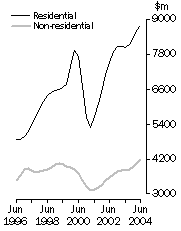JUNE KEY FIGURES
 |  | Jun qtr 04 | Mar qtr 04 to Jun qtr 04 | Jun qtr 03 to Jun qtr 04 |  |
 |  | $m | % change | % change |  |
TREND ESTIMATES(a) |  |
|  |
| Value of work done |  |  |  |  |
 | Building | 13,005.0 | 2.2 | 10.1 |  |
 | Residential | 8,800.7 | 1.9 | 9.7 |  |
 | Non-residential | 4,185.9 | 2.3 | 10.3 |  |
 | Engineering | 6,713.0 | 0.4 | 5.5 |  |
 | Total construction | 19,731.1 | 1.7 | 8.5 |  |
SEASONALLY ADJUSTED ESTIMATES(a) |  |
|  |
| Value of work done |  |  |  |  |
 | Building | 12,888.3 | 0.8 | 10.8 |  |
 | Residential | 8,716.8 | 0.2 | 11.3 |  |
 | Non-residential | 4,171.5 | 1.9 | 9.7 |  |
 | Engineering | 6,571.5 | -3.4 | 2.4 |  |
 | Total construction | 19,459.8 | -0.7 | 7.8 |  |
|  |
| (a) Reference year for Chain Volume Measures is 2002-2003. |
Value of construction work done, Volume terms - Trend estimates

| Value of building work done, Volume terms - Trend estimates

|
JUNE KEY POINTS
VALUE OF CONSTRUCTION WORK DONE, VOLUME TERMS
TREND ESTIMATES
- The trend estimate of building work done rose 2.2% in the June quarter 2004. There was continued growth in both residential (+1.9%) and non-residential building (+2.3%).
- Engineering work done rose by 0.4% in the latest quarter, the thirteenth successive quarterly increase. Total construction rose by 1.7%.
SEASONALLY ADJUSTED ESTIMATES
- The seasonally adjusted estimate of building work done rose by 0.8% in the June quarter to $12,888.3m, the highest level on record. Residential building rose 0.2% to $8,716.8m, with new residential work up marginally to $7,372.2m. Both series recorded their second highest levels on record. Non-residential building rose 1.9% to $4,171.5m, the highest level recorded since the December quarter 1990.
- Engineering work done fell 3.4%, to $6,571.5m. Work done for the private sector fell by 6.3%, to $3,725.0m, while work for the public sector rose 0.8%, to $2,846.5m.
- Total construction work fell 0.7% to $19,459.8m.
NOTES
ABOUT THIS ISSUE
This publication provides an early indication of trends in building and engineering construction activity. The data are estimates based on a response rate of approximately 80% of the value of both building and engineering work done during the quarter. More comprehensive and updated results will be released in Building Activity, Australia (cat. no. 8752.0) on 13 October 2004 and in Engineering Construction Activity, Australia (cat. no. 8762.0) on 12 October 2004.
CHANGES IN THIS ISSUE
A new base year, 2002-03, has been introduced into the chain volume estimates which has resulted in revisions to growth rates in subsequent periods.
In addition, the chain volume estimates have been re-referenced to 2002-03, thereby preserving additivity in the quarters after the reference year. Re-referencing affects the levels of, but not the movements in, chain volume estimates.
A feature article, 'Work in the pipeline', is included on pages 5-7. Updated data on this topic will also be included in future issues of this publication.
The AusStats series contains two new tables (13 and 14) showing state and territory Construction Work Done in Chain Volume Measures for original, seasonally adjusted and trend data.
INQUIRIES
For further information about these and related statistics, contact the National Information and Referral Service on 1300 135 070 or David Finlay on Adelaide (08) 8237 7431.
SUMMARY COMMENTARY
CONSTRUCITON WORK DONE, CHAIN VOLUME MEASURES-TREND PERCENTAGE CHANGE
TOTAL CONSTRUCTION
The total value of construction work done has increased each quarter for the last three years, with the exception of the June quarter 2003.
ENGINEERING
Engineering construction work done has increased for thirteen successive quarters.
BUILDING
Total building work done has increased for the last four quarters, following a small decline in the June quarter 2003.
RESIDENTIAL
Residential building work has increased for the last four quarters, following small declines in the first half of 2003.
NON-RESIDENTIAL
Non-residential building work has increased for the last four quarters, following a small decline in the June quarter 2003.
CONSTRUCTION WORK DONE, STATES AND TERRITORIES, CHAIN VOLUME MEASRUES - TREND ESTIMATES
NEW SOUTH WALES, VICTORIA
The strong growth in construction work done, evident since early 2001, has eased over recent quarters in both New South Wales and Victoria.
QUEENSLAND, WESTERN AUSTRALIA
Construction work done has risen strongly in Queensland since early 2001, with growth in the last five quarters dominated by building work. In Western Australia, while both sectors were strong in 2002-03, total construction work has been flat for the last five quarters.
SOUTH AUSTRALIA, TASMANIA
Following strong growth since early 2001, construction work done has fallen in South Australia over the last three quarters, due to declines in the engineering sector. In Tasmania, growth has been strong for the last five quarters in both sectors.
NORTHERN TERRITORY, AUSTRALIAN CAPITAL TERRITORY
Construction work done in the Northern Territory has risen over the last six quarters driven mainly by the engineering sector. In the Australian Capital Territory, the fall over the last five quarters has been due to declines in both sectors.
 Print Page
Print Page
 Print All
Print All